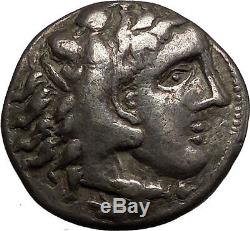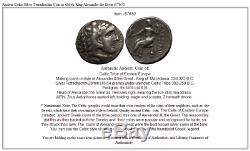Ancient Celtic Silver Tetradrachm Coin as Greek King Alexander the Great i57630





Item: i57630 Authentic Ancient Coin of. Celtic Tribe of Eastern Europe Making coins in style of Alexander III the Great - King of Macedonia: 336-323 B. Silver Tetradrachm 28mm (16.64 grams) under unknown Celtic Tribe 300-250 B.
Pedigree: Ex NFA Lot 615 Head of Alexander the Great as Hercules right, wearing the lion-skin headdress. AEIN, Zeus Aetophoros seated left, holding eagle and scepter; Z beneath throne.
Numismatic Note: The Celtic peoples would issue their own versions of the coins of their neighbors, such as the Greeks which have their own unique style to behold. The Celts of Eastern Europe imitated ancient Greek coins of the time period, this one of Alexander III, the Great. The reason they did this as they traded with the Greeks and their coins were popular and recognized for trade, so they struck their own.The coins of Alexander the Great were the best known silver coins of the time. You can see the Celtic style showing on this coin along with the blundered Greek legend. Or /slts/, see Celtic pronunciation of were a diverse group of tribal societies in Iron Age and Roman-era Europe who spoke Celtic languages. Diachronic distribution of Celtic peoples.
Core Hallstatt territory, by the 6th century BC. Maximal Celtic expansion, by 275 BC. Lusitanian area of Iberia where Celtic presence is uncertain. The "six Celtic nations" which retained significant numbers of Celtic speakers into the Early Modern period. Areas where Celtic languages remain widely spoken today. The earliest archaeological culture commonly accepted as Celtic, or rather Proto-Celtic , was the central European Hallstatt culture c. 800-450 BC, named for the rich grave finds in Hallstatt , Austria. By the later La Tène period c. 450 BC up to the Roman conquest, this Celtic culture had expanded over a wide range of regions, whether by diffusion or migration : to the British Isles (Insular Celts), the Iberian Peninsula (Celtiberians , Celtici and Gallaeci), much of Central Europe , (Gauls) and following the Gallic invasion of the Balkans in 279 BC as far east as central Anatolia (Galatians). The earliest directly attested examples of a Celtic language are the Lepontic inscriptions, beginning from the 6th century BC. Continental Celtic languages are attested only in inscriptions and place-names. Insular Celtic is attested from about the 4th century AD in ogham inscriptions , although it is clearly much earlier. Literary tradition begins with Old Irish from about the 8th century. Coherent texts of Early Irish literature , such as the Táin Bó Cúailnge (The Cattle Raid of Cooley), survive in 12th-century recensions.According to the theory of John T. Koch and others, the Tartessian language may have been the earliest directly attested Celtic language with the Tartessian written script used in the inscriptions based on a version of a Phoenician script in use around 825 BC. By mid 1st millennium AD, following the expansion of the Roman Empire and the Great Migrations (Migration Period) of Germanic peoples , Celtic culture and Insular Celtic had become restricted to Ireland and to the western and northern parts of Great Britain (Wales , Scotland , Cornwall and the Isle of Man) and northern France (Brittany). The Continental Celtic languages ceased to be widely used by the 6th century. Insular Celtic culture diversified into that of the Gaels (Irish , Scottish and Manx), the Brythonic Celts (Welsh , Cornish , and Bretons) of the medieval and modern periods.
A modern " Celtic identity " was constructed in the context of the Romanticist Celtic Revival in Great Britain (Wales, Scotland, Cornwall and the Isle of Man) and Ireland. In France a similar revival of Breton is taking place in Brittany. Alexander III of Macedon (20/21 July 356 BC 10/11 June 323 BC), commonly known as Alexander the Great , was a King (Basileus) of the Ancient Greek kingdom of Macedon and a member of the Argead dynasty , an ancient Greek royal house. Born in Pella in 356 BC, Alexander succeeded his father, Philip II , to the throne at the age of twenty. He spent most of his ruling years on an unprecedented military campaign through Asia and northeast Africa, and by the age of thirty he had created one of the largest empires of the ancient world, stretching from Greece to Egypt into northwest India and modern-day Pakistan. He was undefeated in battle and is widely considered one of history's most successful military commanders.During his youth, Alexander was tutored by the philosopher Aristotle until the age of 16. After Philip's assassination in 336 BC, Alexander succeeded his father to the throne and inherited a strong kingdom and an experienced army.
Alexander was awarded the generalship of Greece and used this authority to launch his father's Panhellenic project to lead the Greeks in the conquest of Persia. In 334 BC, he invaded the Achaemenid Empire , ruled Asia Minor , and began a series of campaigns that lasted ten years. Alexander broke the power of Persia in a series of decisive battles, most notably the battles of Issus and Gaugamela. He subsequently overthrew the Persian King Darius III and conquered the Achaemenid Empire in its entirety. At that point, his empire stretched from the Adriatic Sea to the Indus River.
Seeking to reach the "ends of the world and the Great Outer Sea", he invaded India in 326 BC, but was eventually forced to turn back at the demand of his troops. Alexander died in Babylon in 323 BC, the city he planned to establish as his capital, without executing a series of planned campaigns that would have begun with an invasion of Arabia. In the years following his death, a series of civil wars tore his empire apart, resulting in several states ruled by the Diadochi , Alexander's surviving generals and heirs. Alexander's legacy includes the cultural diffusion his conquests engendered, such as Greco-Buddhism.
He founded some twenty cities that bore his name , most notably Alexandria in Egypt. Alexander's settlement of Greek colonists and the resulting spread of Greek culture in the east resulted in a new Hellenistic civilization , aspects of which were still evident in the traditions of the Byzantine Empire in the mid-15th century and the presence of Greek speakers in central and far eastern Anatolia until the 1920s. Alexander became legendary as a classical hero in the mold of Achilles , and he features prominently in the history and mythic traditions of both Greek and non-Greek cultures. He became the measure against which military leaders compared themselves, and military academies throughout the world still teach his tactics. He is often ranked among the most influential people in human history, along with his teacher Aristotle.What is a certificate of authenticity and what guarantees do you give that the item is authentic? You will be quite happy with what you get with the COA; a professional presentation of the coin, with all of the relevant information and a picture of the coin you saw in the listing. Is there a number I can call you with questions about my order? When should I leave feedback?
Once you receive your order, please leave a positive. Please don't leave any negative feedbacks, as it happens many times that people rush to leave feedback before letting sufficient time for the order to arrive.
The matter of fact is that any issues can be resolved, as reputation is most important to me. My goal is to provide superior products and quality of service. The item "Ancient Celtic Silver Tetradrachm Coin as Greek King Alexander the Great i57630" is in sale since Wednesday, September 7, 2016. This item is in the category "Coins & Paper Money\Coins\ Ancient\Other Ancient Coins".
The seller is "highrating_lowprice" and is located in Rego Park, New York. This item can be shipped worldwide.

